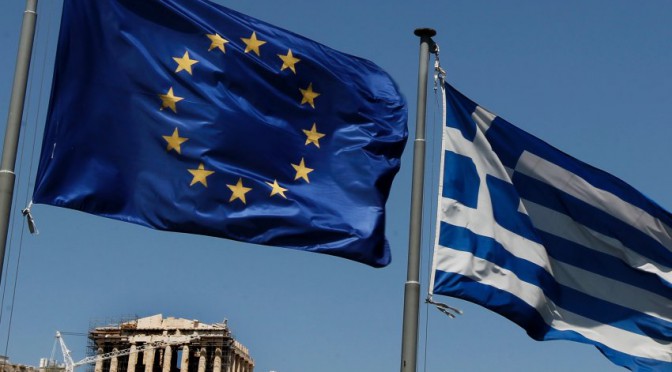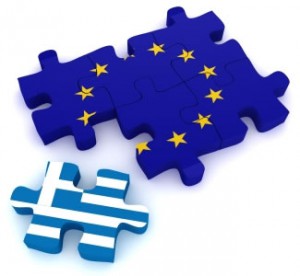Earlier in the evening I took a few minutes to study and sign an online petition on the Greece debt crisis. I also made the bold statement of changing my Facebook profile picture to a sticker expressing solidarity with the Greek people. As I went back to the desk to complete a report with an imminent deadline, I had problems concentrating because of the numerous questions and thoughts that kept whirling round inside my head about Greece. I am supposed to resist the urge to write about the unfolding menace until after the Sunday referendum, I reminded myself. What’s the point of waiting? The referendum won’t change everything, would it? And anyway, I need to clear my head of these nagging questions, these thoughts…
The founding fathers of the EU will be turning in the grave right now pondering about what has become of the Union they created? As if the inhuman treatment of refugees in the Mediterranean isn’t enough naked dances in the market square, there are subtle, yet concerted efforts now by the traditional conservative powers to oust the popular Syriza Government of Greece through sabotage. Truth be told, no government within the European Union has ever dared challenge the status quo in the manner that the current Greek government is doing. They are feared as the biggest threat to renewed growth, job creation, economic prosperity, political integration and peace in Europe. That is untrue and it reminds me of a Nigerian Igbo adage to the effect that when a peer fetches better firewood, he’s accused of fetching those in a forbidden evil forest. The truth is to be found in the story of how Greece got to where they currently are.
So how did the Greeks get here?
After Greece joined the monetary union of Europe in 2001, the tiny country of 10 million (about same population as Belgium and smaller than Lagos State, Nigeria) was flooded with money from elsewhere on the Continent. Over the course of the decade that followed, Greek leaders, who can’t be said not to be corrupt, ran an economy long rife with patronage and tax evasion. They borrowed billions from their imprudent friends at European banks, and then perfected a culture of non-disclosure to EU officials about mounting debts. When the financial crisis finally rolled into Greece in 2009 and 2010, the country was in an estimated $430 billion in debt[i], a staggering figure that imperilled the economic health of its near and distant neighbours — indeed, all of Europe. The European Commission, International Monetary Fund and the European Central Bank (often referred to as the Troika) agreed to bail out the sinking economy by loaning it $146 billion. The bailout was not without a price tag, which was fixed by the bailers (Troika) and signed by the bailed (Greek Government).
A bailout with huge price tag
The strangulating price tag for the Greek bailout had nothing seriously to do with raising new funds, through proper corporate taxes or social security contributions but had mainly to do with austerity measures that meted out untold hardship to the hardworking Greek men and women. Let’s look at just a few of them and what they resulted in. One of the effects was reduction in state spending by slashing pensions and wages, eliminating jobs and unreasonable rise in wage taxes. As if the 2009 austerity measures were not bad enough, in 2012 an even larger rescue provided only temporary succour. Major infectious diseases soon came fully back in Greece, the figures for HIV and tuberculosis went sky high and malaria made a nasty return after 40 years of absence. Meanwhile spending on mental health care fell between 2010 and 2011 by 20%, and another 55% between 2011 and 2012 resulting directly in a rise in depression and suicides by as much as 45%. Very quickly it became clear that the spending cuts are producing what many Greeks consider to be a humanitarian crisis. It is apparent from all objective analyses that the core beneficiaries of the so-called bailout were Greek, German, Dutch and French big banks, who had to be rescued partly on the back of the ordinary Greek citizens. The best that could be said about the bailers is that they made some wrong choices but it could very well be a case of criminal negligence.
In my May 2014 bid for a seat at the European Parliament, I was asked during a debate with colleagues of the liberal democrats political family, to adduce the basis of my social policy agenda. I recall drawing attention to the growing inequality between people within Europe, but also between European citizens and people from other countries. The traditional parties won’t ever own up the fact that their neo-liberal and conservative social and economic policy path since the 1980s is the direct cause of the financial crisis of 2008, the euro crisis of 2010 and rising poverty (25% or 121 million poor Europeans) especially youths and infant poor. Today Greece has 59.1% youth unemployment, Spain 55.9%, Italy 38.4%, and Portugal 38.3%. All efforts by the European progressives, and the genuine humane reform agenda of the Syriza government to institute people-centered economic and social policy driven by fair and equitable policies were all thwarted then as they continue to be thwarted today. The large European political families are award-winners in blocking progressive Bills. Dr Elizabeth Mestheneos, an Athens based British sociologist couldn’t be clearer when she said “It is a nasty game and of course going to the Drachma (the Greek national currency before the Euro) is not easy. We have few resources and a very split society. Politicians have often colluded in taking loans nationally and using them inappropriately, appointing Kin to jobs – I think this is familiar in Nigeria! And still going on! There are too many ideologies of diverse types. We even have Stalinists, Nazi types and plenty of anarchists. Too few people who know how to cooperate. Too many (mainly but not exclusively) male egos. I think most of us want the EU to work but it has been hijacked and the politicians are another generation without the same commitment to the European ideals. We are fighting for a better Europe, not run by bankers and big businesses” Greek debt exploded over a seven-year period up to 177%. The huge private debts in Greece were built by irresponsible behaviour of large European banks providing cheap credits. Of all the billions that have been made available in recent years, about 90% flowed back to the banks and other creditors hence Paul De Grauwe, a leading Belgian Professor of economics had this to say “The creditors have not learned anything from the crisis. With their demands they push the Greek economy deeper into trouble and yet they manage to make the media believe that the Greeks are unreasonable, and not themselves”[ii]
The Troika miscalculations
The way and manner Eurogroup Chairman, Jeroen Dijsselbloem and EU Finance Ministers are conducting their negotiations with Greek’s Finance Minister, Yanis Varoufakis, is as though economics is an end in itself. There is no realisation that economics should be fashioned to serve people. They are beclouded by a tunnel vision resulting in unacceptably high human toll. The authoritative medical journal The Lancet reported that since 2008 the number of stillborn children increased by 21%. More and more pregnant women lack the resources for prenatal testing. Infant mortality increased by 43%. In many schools, private sector food banks are organised to stop school kids from fainting during classes.[iii]
It is not only Greece that needs saving. Europe needs to save itself too and all attentive watchers of Varoufakis would notice that he’s determined to lead that agitation to save Europe from itself and by so doing save Greece and others along with it. He ran his 2014 election making no secret of his agenda. In a book[iv] he co-authored in 2010 and revised in 2013 I read the following “Europe is fragmenting. As this happens, human costs mount, and disintegration becomes an increasing threat. . . . The fallout from a Eurozone breakup would destroy the European Union, except perhaps in name. And Europe’s fragmentation poses a global danger.”
I share these sentiments and would see the Greece troubles beyond my nose. It is Europe’s troubles too and by extension a global trouble. As all hands are put on deck, whatever the outcome of the July 5th referendum, a write-off of some parts of the Greek debt should not be ruled out. Except of course we want to rule out a sustainable solution to the crisis.
The author, Collins Nweke, was a 2014 candidate Member European Parliament and currently serves as Municipal Councillor at Ostend City Council. He made this contribution from Brussels Belgium
[i] Suzy Hansen (New York Times, 20 May 2015)
[ii] Paul De Grauwe in an interview in De Standaard, Belgium of 16 June 2015
[iii] The Lancet medical journal 2008
[iv] Y. Varoufakis, S. Holland and K. Galbraith: A Modest Proposal for Resolving the Eurozone Crisis, 2010, revised July 2013

